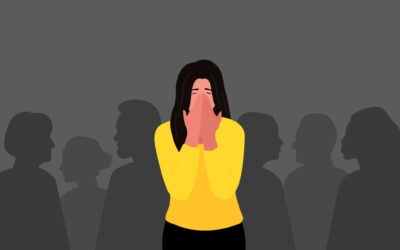Do you feel stressed in your life? If yes then you are at the right place. This blog will help you understand and learn effective techniques to cope up with stress.

Stress is a problem that many people struggle with on a day-to-day basis. People frequently exhibit overwhelming feelings as a result of the stresses that are a part of modern life. As work emails mount due to advancements in technology, we are frequently glued to our phones. Social media keeps us linked all the time as well, which has both benefits and drawbacks.
The issue is that we’re made to believe that we must complete everything there is to do including earning, making an impact, traveling, buying a house, investing, and growing, within a very limited time frame. Despite the rise of superman or superwoman, it is not possible to balance work and personal obligations, travel, and professional development, or to be both creative and physically healthy all at once.
It becomes extremely difficult to preserve the impression of perfection. In addition to overcommitting, there is also a lack of prioritization, which causes people to feel as though their lives are being dragged in numerous directions with no clear focus, aim, or purpose. This can lead to a sense of unfulfillment or underachievement, which when combined with an increased workload is a recipe for burnout.
Stress is a state of tension, either emotionally or physically. Any circumstance or idea that gives you cause for dissatisfaction, rage, or anxiety can trigger it. Your body’s response to a demand or challenge is what constitutes stress. Stress can occasionally be advantageous, such as when it keeps you safe or helps you reach a deadline. However, chronic stress can be bad for your health.
IMPACT
Hormones are released by your body in response to stress. These hormones drive your muscles to tense up, your pulse to quicken, and your brain to become more alert. These responses are beneficial in the short term since they can assist you in managing stressful circumstances. This is how your body defends itself. However,
Even when there is no threat, persistent stress causes your body to remain alert. This increases your risk of developing health issues over time. The first step in creating strategies to control its negative effects is learning how to recognize the symptoms of stress.
The following are a few of the more prevalent physiological, psychological, and emotional symptoms of chronic stress:
- Elevated blood pressure
- Heart conditions
- Diabetes or Obesity
- Depressive moods or worry
- Skin conditions including acne
- Headaches
- A lack of drive or attentiveness
- Sexual issues
- Stiff joints
- Drinking or using medications to unwind
- Gain or loss of weight
- Having trouble falling asleep
- Having thoughts about one or more stressors repeatedly
- Changing behavior, such as withdrawing from social situations, and feeling upset
What causes stress?
A stressor and real stress are two different things. A person, place, or circumstance that is causing you to stress is referred to as a stressor. The real reaction to one or more of those stimuli is stress.
Numerous circumstances have the potential to be stressful. Some of the more typical stressors, according to licensed psychotherapist Dr. Gary Brown, are as follows:
- Relationship issues in the home
- The addition of new or increased workload demands
- Financial difficulties
- A loved one’s demise
- Health issues
- Relocating to a new place
- Encounter with one or more traumatic experiences, including being in a car accident or being a victim of a violent crime
Managing Stress
- Diet and Exercise – To begin with, exercise can help you sleep better. Improved stress management also results from better sleep. People who exercise more frequently tend to obtain better deep “slow wave” sleep, which helps regenerate the brain and body. Just be careful not to exercise too close to bedtime, as this can disturb some people’s sleep. The mood seems to benefit from exercise as well. The fact that marijuana prompts the release of several chemicals, including endorphins, which aid in blocking pain and enhancing sleep, maybe a contributing factor. Eating healthy foods has advantages for your mental health in addition to your waistline. A nutritious diet can boost your immune system, balance your mood, lower your blood pressure, and lessen the negative effects of stress. The opposite outcome may occur if there is a lot of added sugar and fat. Additionally, when you’re stressed out, junk food may seem much more attractive. Look for complex carbs, lean proteins, and fatty acids in foods like fish, meat, eggs, and nuts to keep healthy and balanced.
- Relaxation Techniques – Yoga is a technique for relaxation. Although it is a workout, this can also be a sort of meditation. Yoga comes in a variety of forms. The exercises that emphasize deep breathing, stretching, and moderate movement are the most effective for reducing anxiety and tension.
- Meditation – There is a reason why it has persisted for more than 5,000 years. Numerous people find that meditation is effective and beneficial. It can enhance mood, sleep, and energy levels while reducing stress, anxiety, and chronic pain.
- Deep Breathing – Deep breathing exercises activate your body’s inherent relaxation response. This induces a deep sleep that alters how your body reacts to stress. More oxygen is delivered to the brain, and the area of the neurological system in charge of relaxation is calmed.
- Sleep – You can have trouble falling asleep as a result of stress. You need seven to eight uninterrupted hours of sleep each night on average. In order to practice excellent sleep hygiene, your bedroom plays a crucial role. Your room should generally be quiet, dark, and comfortable. There is also a significant significance for your bed. Support, space, and most importantly comfort, should all be features of your mattress.
- Stay Close to Loved Ones – Do not avoid your family and friends in time of need. It might feel like you would rather isolate yourself than trouble others with your problems, but sometimes that is the only antidote to extreme stress and worry. So stay connected with them and share your highs and lows to get the support you need.
- THERAPY – You don’t need to work on everything by yourself, it is okay to reach out for help from a professional mental health therapist who can better guide you through each of your concerns step by step, without overwhelming you in the process. A lot of therapeutic approaches have been successful in dealing with stress depending on each client. A few therapies include – cognitive behavioral therapy, art therapy, music therapy, acceptance and commitment therapy, mindfulness-based stress reduction, etc.
A mixture of these interventions can help you overcome stress in the best possible manner.
Conclusion
In reality, eustress is a natural part of existence. It sometimes accomplishes something useful. Stress can spur you on to run the final mile of a marathon or earn that promotion at work. However, if you don’t manage your stress and it persists, it could have a negative impact on your job, family, and health as it becomes distressed.
We experience constant pressure in the hectic environment of today. At home and at work, we have obligations. Sometimes everything simply gets to be too much. However, especially in light of the Covid-19 situation, we are all living in incredibly anxious times. It’s far too simple to feel overburdened and to let bad feelings take control of our lives.
Our unpleasant emotions and ideas may become less frequent and intense if we can learn to control them. It takes time, patience, and practice to become a good, caring friend to yourself. It’s worthwhile, though. You deserve it.
settings.
7 Cognitive Distortion & Way to deal with them
Cognitive distortions or faulty thinking patterns are unnecessary or irrational thought habits. These negative thought patterns can contribute to issues like anxiety, sadness, and substance abuse as well as decrease your motivation and self-esteem. Cognitive...
7 Red Flags you have been Gaslighted
The phrase "gaslighting" originates from a 1938 play by Patrick Hamilton called "Angel Street" in America, which Alfred Hitchcock later turned into the movie "Gas Light." In the thriller movie, a cunning spouse tries to make his wife believe she is going crazy by...
Are you Unhappy with your Life?
There are many challenges in life that are beyond your control. You have no influence over the weather, your inherited traits, incurable diseases, or your aging process. Although you might have influence, you can't really stop other grownups from acting the way they...
Heal Your Trauma Today
Psychological trauma consists of extremely stressful circumstances that destroyed your sense of safety and left you feeling helpless in a hazardous environment. You may struggle with troubling feelings, memories, and anxiety as a result of psychological trauma. You...
How to deal with Irrational Fears
Some individuals may find the word "irrational" insulting. In light of the fact that the fear seems to be extremely real, there may possibly be a valid basis for it. But depending on how it controls your life, even a reasonable fear might be irrational. Most people...
How to deal with Social Anxiety
It's common to experience anxiety in certain social settings. For instance, giving a presentation or going on a date can make you feel a little nervous, which is expected. A mental health issue known as social anxiety disorder is defined by a dread of being observed...






